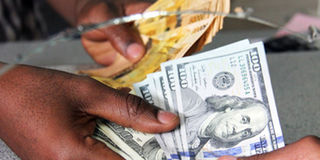Shilling recovers after BoU injects $10 million

The unit recovered yesterday with BoU counters closing at Shs3,459 (buying) and Shs3,469 (selling). PHOTO BY STEPHEN OTAGE.
Kampala- Bank of Uganda yesterday intervened in the currency markets as it sought to salvage the highly volatile shilling.
The Central Bank director for communications, Christine Alupo told Daily Monitor yesterday: “Yes, we have intervened…..”, but declined to reveal how much dollars had been injected into the market.
However, Daily Monitor understands, the Central Bank at least pumped more than $10m in the money markets driving the figure to more than $210m dollars since beginning of the year.
The injections seek to calm the speed at which the shilling is depreciating, considering it opened yesterday at Shs3,650 (buying) and Shs3,660 (selling) but gained after the injections to buy at Shs3,329 and Shs3,339 (selling) before closing at Shs3,459 on the buying and Shs3,469 on the selling side.
Mr Stephen Kaboyo, the managing partner at Alpha Capital, a forex trading firm, said the Central Bank had been forced to intervene after the unit threatened to lose more ground having fallen to Shs3,650.
“This action (intervention) has calmed the nerves and the Shilling recouped some losses, however, the market is still jittery. We were on the verge of seeing capital flight,” he said.
Variance in selling vs buying rate
Forex dealers, for instance at Crane Forex Bureau quoted the unit at Shs3,320 (buying) but sold at a high of Shs3,650, saying “…were are trying to improve our costing that is why there is a big margin”.
The Shilling, experts say had been sent on a tailspin (nosedive) after Mr Emmanuel Tumusiime Mutebile, the Central Bank governor told manufacturers in Kampala last week that they would not inject dollars in the currency market to prop up the unit.
“It is not sustainable for the Bank of Uganda to try and prop up the exchange rate, at levels which are not consistent with supply and demand in the foreign exchange market, by intervening and selling foreign currency. The BoU would simply deplete its foreign exchange reserves if it attempted to do this,” he said.
In East Africa the Ugandan currency has been the hardest hit losing by more than 27 per cent since the beginning of the year compared to Tanzania’s 20 per cent and Kenya’s 13 per cent. Across Africa, the South African Rand has lost by 15 per cent and the Nigerian Naira by 20 per cent.
Mr Aly Khan Satchu, a Nairobi-based financial analyst focusing on East Africa said yesterday: “It’s been a bloodbath for sub Saharan African currencies in 2015,” considering that most countries in the region are struggling with reducing foreign exchange inflows.
However, he said the Uganda Shilling had and will continue to face a challenging time given that the country has an expensive election year (2016) ahead.




